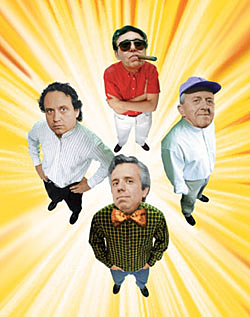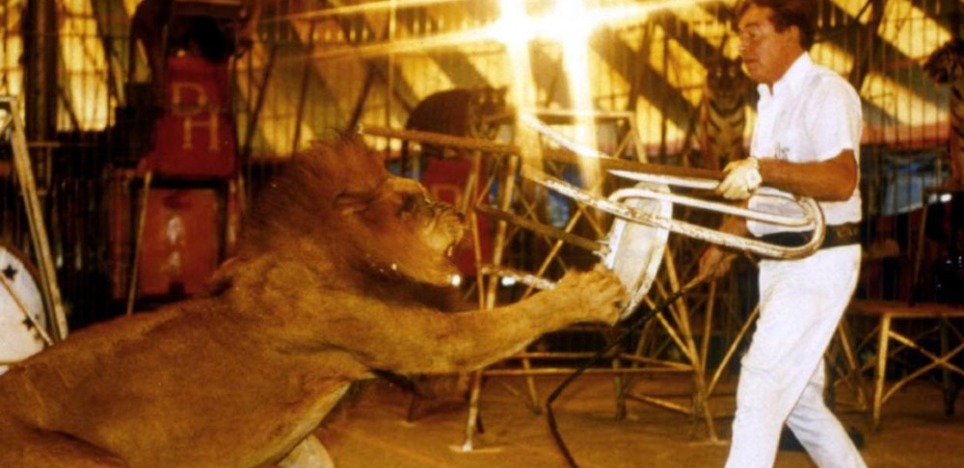It is rare and wonderful thing to find people who genuinely love their work. There is a gleam in their eyes when they talk about the surprises and the thrills that accompany their labors. Even when these vocational enthusiasts face the inevitable challenges and daunting obstacles, they persevere with a cheerful diligence. That is certainly the case with the four creative individuals profiled in this extraordinary documentary by Errol Morris.
David Hoover is a wild animal tamer who has a fondness in his heart for the the man who inspired him to take up the profession — the late Clyde Beatty, the famous trainer who starred in movie serials and radio programs. We see Hoover at work in the cage with lions and tigers. He respects their ferocity and is under no illusion about the dangers he faces in their presence. "If you aren't afraid, then you're gonna pay" he quips.
George Mendonca is a topiary gardener who expresses his creativity by fashioning hedges and trees into a variety of animal shapes. He acknowledges that his art is always in danger of being destroyed by storms, insects, and other rampages of nature. With great patience and pride in his craft he goes about his work using hand clippers to groom a giraffe, bear, and other animals.
Ray Mendez is an expert on hairless mole rats. He has spent years studying these mammals since they were discovered living in underground tunnels in Africa. Wearing a bow tie the shape of a butterfly, he explains with barely submerged excitement the pleasure he derives from observing their unusual habits. He notes that their tiny jaws are so strong they can chew through most walls. He's put his knowledge to work designing museum exhibits for the mole rats.
Finally, there is Rodney Brooks, a M.I.T. scientist who designs autonomous robots. He exudes great joy while talking about his work making insect-like robots. He and his colleagues don't even worry when one falls down. Brooks predicts that eventually carbon-based life will be replaced by silicon-based life.
In this eccentric documentary, Director Morris teases us into thinking about the blurring of boundaries between life and machines, animals and human beings. We are challenged to consider our futile efforts to control life and to evade the transitory nature of our ideas and projects.
Fast, Cheap & Out of Control is a perfect choice for those who want something completely different in their VHS/DVD viewing. It was voted Best Documentary of 1996 by the New York Film Critics Circle, and Roger Ebert called it "One of the 10 Best Films of the Year." Be sure to savor the plentiful circus metaphors; the humorous clips from Darkest Africa, a serial starring Clyde Beatty; and the lively music score by Caleb Sampson which delivers its own enchantments. The film runs 82 minutes and is rated PG (mild thematic elements).

Clockwise from top: David Hoover, George Mendonca, Ray Mendez, and Rodney Brooks
1. Contentment in Work
"The artist Louise Nevelson is quoted in Donald Hall's Life Work: "You have to be with the work and the work has to be with you. It absorbs you totally and you absorb it totally."
- The topiary artist George Mendonca comes across as a person who is totally absorbed in his work. What character quality contribute to his approach?
- Think about the past week. When were you totally absorbed in your work? What would you say are the major obstacles to achieving this kind of exhilarating approach on a regular basis? What spiritual practices could help you to be more fully attuned to what you do?
2. Play and the Creative Mind
"The creation of something new is not accomplished by the intellect but by the play instinct acting from inner necessity. The creative mind plays with the objects it loves," psychologist C. G. Jung said.
- Which scenes in this documentary best convey the joy that the profiled men feel when their minds are creatively playing with all the possibilities? Who is the most playful of the four?
- What aspects or assignments in your work life give you the chance to experience the play of your mind? Share a story about something new you created.
3. The Lure of Learning
Ray Mendez, the expert on hairless mole rats, says of his research: "This has nothing to do with science. I look at it strictly from the point of view of self-knowledge."
- What is the most impressive thing about this scientist's attitudes toward his work?
- Make a list of things you have learned about yourself while working. What has your job taught you about your deeper self and some of the finer points of your psyche and soul?
4. Work as a Social Activity
In Conversation, Theodore Zeldin writes: "The truly privileged today are the small minority for whom work is a pleasure. In the past, work was as much a social as an economic activity too. Go to an old-fashioned oriental bazaar, and you will find shopkeepers as interested in making friends with you, to the extent of offering you coffee, as in closing a sale."
- Which of the four men seems to have found the most pleasure in working with others? What scene best illustrates your answer?
- In what ways does your work give you pleasure? What social dimensions of your job are most rewarding? Share a story about a company or a store you have visited where being a friendly neighbor is as important as closing a deal.
5. Working with Gusto
In Writing from the Center, Scott Russell Sanders states: "When I consider the varied personalities of those diligent people, I feel certain that the willingness to work hard without complaint, indeed with gusto, has less to do with temperament than with conviction. If you believe that work is an evil to be avoided, if you aspire to loaf and invite your ease, then you will grab for every labor-saving gimmick, you will dodge every demand for effort, whether on the job or in school or at home, and you will coax or bully others into providing for your needs. But if you believe that work is a calling, a discipline, a way of exercising your gifts, even a way toward God, then work will seem to you as natural, as desirable, as breathing."
- Share your responses to the idea that the willingness to work hard has less to do with temperament and more to do with conviction.
- Name some people you know whose work seems as natural and as desirable as breathing.
6. The Gift of Encouragement
John O'Donohue writes in Eternal Echoes: "There are people whose presence is encouraging. One of the most beautiful gifts in the world is the gift of encouragement. When someone encourages you, that person helps you over the threshold you might otherwise never have crossed on your own."
- David Hoover talks a lot about Clyde Beatty, the animal trainer who also appeared in movies (clips of which are seen in the documentary). Why is he so appreciative of him?
- Who is the one person who has given you the most encouragement in your work? What does this mean to you?
7. A Spark of God
"Who are the happiest, richest people you know?" Rabbi Shoni Labowitz writes in Miraculous Living. "Aren’t they the people who are living out their visions, regardless of obstacles and challenges? Aren't they the ones who are dreaming even bigger dreams and contributing their talents and resources to the world? These are the people who are living joyful, enthusiastic lives, regardless of their possessions or lack of possessions. These people possess something more precious than material goods. They possess a spark of God that radiates in all they do."
- Discuss a moment in this documentary that gave you a fresh insight into work and its meaning for you. What personal characteristics do these four men share?
- What spiritual practices have you tried to help you bring out the spark of God in you as you work?
This guide is one in a series of more than 200 Values & Visions Guides written by Frederic and Mary Ann Brussat. Text copyright 2004 by Frederic and Mary Ann Brussat. Photos courtesy of Columbia TriStar Home Entertainment. This guide is posted as a service to visitors to www.SpiritualityandPractice.com. It may not be photocopied, reprinted, or distributed electronically without permission from Frederic and Mary Ann Brussat. For this permission and for a list of other guides in the Values & Visions series and ordering information, email your name and mailing address to: brussat@spiritualrx.com.
